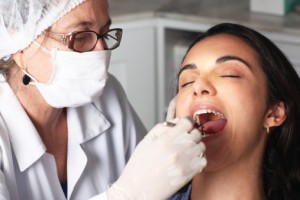 Ever heard the phrase, “you’ve gotta be cruel to be kind?” It has never been truer than when referring to gum disease treatments. Periodontal disease affects as much as 80% of US adults, but the way dental practitioners handle periodontal treatments may be part of the problem. Patients avoid periodontal treatment due to lack of treatment urgency, not fully understanding necessary treatments, and money. Many dentists hesitate to fully explain and recommend periodontal therapy because they fear patients will simply cancel appointments due to the added cost. Instead, dentists tend to try the “nice” approach – recommending periodontal appointments every three months but billing them as regular dental cleanings during six month checkups. However, by changing the focus of periodontal disease treatment to communicating clearly, emphasizing assessment and prevention, and working with patients to maximize insurance benefits, dentists can better equip patients to receive the dental care they need.
Ever heard the phrase, “you’ve gotta be cruel to be kind?” It has never been truer than when referring to gum disease treatments. Periodontal disease affects as much as 80% of US adults, but the way dental practitioners handle periodontal treatments may be part of the problem. Patients avoid periodontal treatment due to lack of treatment urgency, not fully understanding necessary treatments, and money. Many dentists hesitate to fully explain and recommend periodontal therapy because they fear patients will simply cancel appointments due to the added cost. Instead, dentists tend to try the “nice” approach – recommending periodontal appointments every three months but billing them as regular dental cleanings during six month checkups. However, by changing the focus of periodontal disease treatment to communicating clearly, emphasizing assessment and prevention, and working with patients to maximize insurance benefits, dentists can better equip patients to receive the dental care they need.
Continue reading Do Nice Dentists Finish Last? – Do Dentists Have to be Cruel to be Kind?
Tag: Family Dentistry
Caring for Your Smile When You’re Expecting
Are you adding to your family in the near future? Congratulations! This will be an exciting—not to mention busy—time in your life. You’ll have a nursery to decorate, furniture to buy, and plenty of checkups with your doctor.
With everything that’s going on, though, it’s important not to lose sight of your oral health. In fact, regular brushing and flossing will never be as important as they are now. Besides causing symptoms like swollen or bleeding gums, gum disease has also been linked with certain pregnancy complications, like premature birth.
To ensure that your smile stays healthy during your pregnancy, and that your baby stays safe, we recommend the following:
- Clean your smile regularly, paying special attention to your gumline. Gum disease is caused by the accumulation of bacteria and plaque along the gums.
- Enjoy a balanced and nutritious diet. Foods that are processed or sugary will increase your chances of developing gum disease or cavities.
- Talk to your dentists about when to schedule a checkup during your pregnancy. The best time is often during the second trimester.
Like any mom, you want to give your baby the best possible start. With preventive brushing and flossing, you’re already well on your way.
If you have questions about the connection between pregnancy and gum disease, don’t hesitate to talk to your regular family dentist.
Pediatric Dental Care 101: Teach Your Children to Love Their Teeth!
 Teeth need love too! Especially your child’s teeth. The healthy development and maintenance of your child’s first teeth are vitally important to their future health and well being. Primary teeth help children learn to speak clearly and chew naturally. Primary teeth also forge the path that adult teeth follow when they’re ready to erupt. Healthy dental care foundations laid early in life will lead your child to positive dental outcomes in the future. You should choose a family or pediatric dentistry with a friendly environment that focuses on your child’s growth, development, and oral health education. Prevention, in the form of regular dental checkups, will help you take charge of and protect your child’s dental health.
Teeth need love too! Especially your child’s teeth. The healthy development and maintenance of your child’s first teeth are vitally important to their future health and well being. Primary teeth help children learn to speak clearly and chew naturally. Primary teeth also forge the path that adult teeth follow when they’re ready to erupt. Healthy dental care foundations laid early in life will lead your child to positive dental outcomes in the future. You should choose a family or pediatric dentistry with a friendly environment that focuses on your child’s growth, development, and oral health education. Prevention, in the form of regular dental checkups, will help you take charge of and protect your child’s dental health.
When Should Your Child Start Seeing a Pediatric Dentist?
Children should start having comprehensive dental exams twice a year, beginning around their first birthday. Their very first visit will establish a positive outlook towards dental care and dental practitioners.
Does your child have a fear of the dentist?
To help a fearful child visit the dentist, talk with them about the visit. Discuss the positive aspects of good dental care, and remind them that going to the dentist is a privilege for big boys and girls. Try not to use words such as fear, needle, pull, drill, or pain. There are many online resources to help you find dental language that is pleasant and non-frightening to children. Try to reassure your child that dentists and dental office helpers will always be gentle and friendly.
Choose Pediatric Dental Care for a Lifetime of Healthy Smiles
Remember, regular pediatric dental visits give children a solid foundation for a healthy life, through adolescence and adulthood. You should look for an experienced and gentle pediatric dental practice in your area. Pediatric dentists have at least two extra years of specialty training following dental school to treat the special dental needs of children. Pediatric dentists can be the primary or specialty dental care providers for infants, children, and teens. Show your love this season, and make a dental checkup appointment for your child with a qualified pediatric dentist today.
Don’t Just Brush Your Teeth… Brush Your Teeth Correctly
 Most people know that good oral hygiene includes brushing your teeth at least twice a day. And for most, those two times are usually in the morning—as you’re rushing to work or getting the kids off to school—and at night, when you’re fighting to keep your eyes open before falling into bed. Regardless of whether your day is beginning, ending or somewhere in between, proper brushing is worth the time and effort for good oral health.
Most people know that good oral hygiene includes brushing your teeth at least twice a day. And for most, those two times are usually in the morning—as you’re rushing to work or getting the kids off to school—and at night, when you’re fighting to keep your eyes open before falling into bed. Regardless of whether your day is beginning, ending or somewhere in between, proper brushing is worth the time and effort for good oral health.
First off all, did you know that proper brushing requires at least two minutes? Most adults spend a fraction of that time brushing their teeth every morning and night. Try looking at the clock when you start brushing, then brush normally and check the time when you’re finished. Chances are you didn’t spend enough time to thoroughly clean your teeth. To really do a good job and ensure better oral hygiene, spend two minutes brushing.
What is the Best Technique for Brushing Teeth?
When brushing your teeth, it’s important to hold your toothbrush at a 45 degree angle against the gum line and sweep or roll the brush away from your gums. Don’t brush side to side, which can scrape your gums. And be sure to use short strokes as you brush away from your gums.
Start out cleaning the outer surface of your upper teeth and then your lower teeth. Continue by brushing the inner surface of upper and lower teeth. Then, brush the chewing surfaces of your teeth, concentrating on your molars. Finally, be sure to brush your tongue, too.
Tools for Proper Brushing
Always choose a soft brush with round-ended bristles. Stiff bristles can hurt your gums. A powered toothbrush can be a good choice, too, especially if you have difficulty brushing because of limited manual dexterity. The type of toothpaste you choose is an individual matter. There are a variety of toothpastes to address a variety of concerns from teeth whitening and cavity prevention to eliminating tartar and reducing teeth sensitivity. Talk with your local dentist about which toothpaste is best for you.
Don’t Put Off Important Dental Care
 We’ve all had moments where we put off something important. Maybe it was cleaning the house, or getting out to the grocery store, or getting your taxes in the mail. All kinds of things can get pushed aside and even forgotten because we’re simply not ready to tackle them yet. But when it comes to your oral health, procrastinating is the last thing you should do.
We’ve all had moments where we put off something important. Maybe it was cleaning the house, or getting out to the grocery store, or getting your taxes in the mail. All kinds of things can get pushed aside and even forgotten because we’re simply not ready to tackle them yet. But when it comes to your oral health, procrastinating is the last thing you should do.
We understand that your time is precious, but so is your good health and wellbeing. Being proactive about important dental care will benefit your smile. It will also benefit your pocketbook and result in a more positive experience with your dentist.
When you put off essential care, that could mean a more invasive and more expensive procedure later on. But when you seek help early, right at the beginning of a problem, you can receive more conservative treatment. With conservative dentistry, the goal is to preserve as much of a patient’s natural smile as possible.
Some of the most common things that are put off are treatment for gum disease and cavities. But treatment for both is much easier and more cost effective when it happens early.
Do you have important issues that need immediate treatment? Don’t put them off any longer. Call your local dentist today for an appointment!
Four Tips for Helping Your Child Have a Better Dental Visit
 As a parent, helping your child create positive associations with the dentist is an important step in helping them build healthy habits. By creating positive associations at a young age, your child will be more likely to make daily care and regular checkups a priority. In today’s post, we want to offer four steps that will help your child have a better dental visit, in addition to helping him or her create healthy habits.
As a parent, helping your child create positive associations with the dentist is an important step in helping them build healthy habits. By creating positive associations at a young age, your child will be more likely to make daily care and regular checkups a priority. In today’s post, we want to offer four steps that will help your child have a better dental visit, in addition to helping him or her create healthy habits.
Encourage Regular Brushing and Flossing
Your first step should be to help your child learn the importance of daily care. One way you can do this is by demonstrating healthy habits yourself. Why not make brushing and flossing a family activity? There are even specially made toothbrushes that play music to make the experience more fun. Brushing and flossing every day will help your little one have healthy teeth, which will help him or her enjoy better checkups.
Talk to Your Child about What to Expect
If your child is visiting a dentist for the first time, talk to him or her about what to expect. Children are sometimes frightened by new places, sounds, or people. Bringing your child with on you on one of your own appointments can help dispel anxiety and get them accustomed them to the atmosphere of a dental office.
Avoid Scary Words or a Scary Tone
Whether or not your child needs extra care, avoid using words like “pain” or “shot,” and be careful about using your own dental history to relate to your child. Instead, think of ways you can encourage your little one before an appointment. Talk about the positives of having a healthy smile and the ways that dentists can help them improve oral health.
Avoid Bribery
It might be tempting to promise your child a special treat if they make it through their appointment, but this tactic can send the wrong message. Put the focus on good oral hygiene and the importance of a healthy smile instead. Teach them that healthy teeth are a reward in and of themselves.
Do you want to schedule an appointment for your child? Give your local family dentist a call today.
How to Help Your Child Overcome Their Fear of the Dentist’s Office
 Children are known for being incredibly stubborn over some issues, and the dentist’s office is one of the most dreaded places for someone with a smile that’s still developing. It’s not that hard to understand – after all, most adults dislike visiting the dentist as well. Still, when a child becomes frightened or anxious about their regular check-ups, it can make it very difficult for them to sit still long enough to receive the crucial care they need to maintain their teeth. Here are some helpful tips for helping your loved one learn to feel comfortable at the dentist’s office:
Children are known for being incredibly stubborn over some issues, and the dentist’s office is one of the most dreaded places for someone with a smile that’s still developing. It’s not that hard to understand – after all, most adults dislike visiting the dentist as well. Still, when a child becomes frightened or anxious about their regular check-ups, it can make it very difficult for them to sit still long enough to receive the crucial care they need to maintain their teeth. Here are some helpful tips for helping your loved one learn to feel comfortable at the dentist’s office:
Take Them Sooner Rather Than Later
Children are often frightened by unfamiliar places, sounds, or people; avoid this problem by taking them with to your own dental appointment when they’re around one year old. This, coupled with very gentle, quick check-ups for them too once they’re old enough, will help them become accustomed to their surroundings gradually instead of being forced to take it all in at once. Once they’re ready to start attending regular check-ups, they should feel comfortable enough to avoid any tearful scenes in the waiting room.
Try To Avoid Scary Words
Even if your little one does develop dental problems early on, do your best to avoid potentially scary words such as “pain” or “shot.” In fact, do your best to avoid discussing their dental care with a negative tone. Your dentist and their staff will be sure to talk to them in a reassuring way about the work they’ll do.
Don’t Try and Relate To Their Fear
As we’ve already said, many adults also feel fear when it comes to dental visits. However, please don’t share those thoughts with your child or tell them any horror stories from previous visits you’ve had. While this may seem like a good idea to lower yourself to their level, it will only prove to your son or daughter that there is something to be scared of and make them worry unnecessarily.
Do Your Best to Avoid Bribery
Promising your child a special treat if they make it through their appointment often sends the wrong message about what is truly important to your little one; plus, it could make them feel even more anxious and pressured. Instead, focus on how important good oral hygiene is and help them practice at home. Teach them that strong, healthy teeth are their own reward!